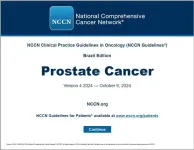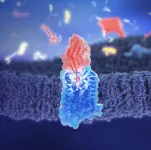(Press-News.org) About The Study: Among critically ill adults who received invasive mechanical ventilation for more than 24 hours, screening frequency (once-daily vs more frequent screening) and spontaneous breathing trial (SBT) technique (pressure-supported vs T-piece SBT) did not change the time to successful extubation. However, an unexpected and statistically significant interaction was identified; protocolized more frequent screening combined with pressure-supported SBTs increased the time to first successful extubation.
Corresponding Author: To contact the corresponding author, Karen E. A. Burns, MD, MSc, email karen.burns@unityhealth.to.
To access the embargoed study: Visit our For The Media website at this link https://media.jamanetwork.com/
(doi:10.1001/jama.2024.20631)
Editor’s Note: Please see the article for additional information, including other authors, author contributions and affiliations, conflict of interest and financial disclosures, and funding and support.
# # #
Media advisory: This study is being presented at the European Society of Intensive Care Medicine LIVES 2024 Annual Congress.
Embed this link to provide your readers free access to the full-text article This link will be live at the embargo time https://jamanetwork.com/journals/jama/fullarticle/10.1001/jama.2024.20631?guestAccessKey=5fe24794-e804-43c8-b63b-f17d31d0b6f2&utm_source=For_The_Media&utm_medium=referral&utm_campaign=ftm_links&utm_content=tfl&utm_term=100924
END
Frequency of screening and spontaneous breathing trial techniques
JAMA
2024-10-09
ELSE PRESS RELEASES FROM THIS DATE:
International collaboration addresses rising cancer rates in South America
2024-10-09
PLYMOUTH MEETING, PA [October 9, 2024] — The National Comprehensive Cancer Network® (NCCN®)—an alliance of leading cancer centers in the United States—announces a renewed collaboration with the Latin American Cooperative Oncology Group (LACOG) to improve cancer outcomes in South America. The international oncology organizations worked together to publish new NCCN Clinical Practice Guidelines in Oncology (NCCN Guidelines®) for Prostate Cancer: Brazil Edition.
The NCCN Guidelines® for Prostate Cancer: Brazil Edition are now available free-of-charge at NCCN.org/global. Additional Brazilian adaptations of NCCN Guidelines ...
The secret to slimming? Special ‘skinny genes’ double weight loss
2024-10-09
The secret to losing weight could all be down to a combination of 14 ‘skinny genes’, a new study has found.
University of Essex researchers discovered they helped people drop twice as much weight when they ran for half an hour three times a week.
The team - led by Dr Henry Chung, from the School of Sport, Rehabilitation and Exercise Sciences - found those with more of the genes slimmed the most across eight weeks.
People with the most markers lost up to 5kg during the study and people without ...
Study finds persistent infection could explain long COVID in some people
2024-10-09
EMBARGOED UNTIL OCTOBER 9, 2024 AT 6:30 AM ET
Brigham researchers found people with wide-ranging long COVID symptoms were twice as likely to have SARS-CoV-2 proteins in their blood, compared to those without long COVID symptoms
A persistent infection could explain why some people experience long COVID symptoms, according to a new study led by researchers at Brigham and Women’s Hospital, a founding member of the Mass General Brigham healthcare system. The team found evidence of persistent infection in 43 percent of participants with cardiopulmonary, ...
COVID-19 infection appeared to increase risk of heart attack & stroke up to 3 years later
2024-10-09
Research Highlights:
An analysis of UK Biobank health data that included adults who had mild to severe COVID-19 before vaccines were available found an increased risk of heart attack, stroke and death among those adults during the nearly three-year follow-up period after COVID infection.
The elevated risk of heart attack, stroke and death linked to COVID-19 infection was found to be comparable to cardiovascular risk factors such as Type 2 diabetes, peripheral artery disease and cardiovascular disease.
The study found that having a non-O blood type (A, B, AB) was associated with an increased risk of heart attack and stroke among ...
History of COVID-19 doubles long-term risk of heart attack, stroke and death
2024-10-09
Wednesday, October 9, 2024, Cleveland: A history of COVID-19 can double the risk of heart attack, stroke or death according to new research led by Cleveland Clinic and the University of Southern California.
The study found that people with any type of COVID-19 infection were twice as likely to have a major cardiac event, such as heart attack, stroke or even death, for up to three years after diagnosis. The risk was significantly higher for patients hospitalized for COVID-19 and more of a determinant than a previous history of heart disease.
Further genetic analysis ...
Tiny antibodies to fight the dangerous effects of opioids
2024-10-09
Opioid drugs are highly effective at relieving pain but come with severe drawbacks. Their side effects range from dizziness to potentially fatal respiratory depression. Their illegal use contributes to nearly half a million deaths worldwide each year. Researchers from the University of Geneva (UNIGE) have discovered a molecule, called nanobody NbE, which binds tightly and durably to the cell receptors that usually bind to opioids, thereby blocking the drugs’ activity. Moreover, the scientists were able to create even smaller molecules that retain the same properties, which could prove far more effective than current treatments in ...
Researchers discover how plants produce a novel anti-stress molecule
2024-10-09
New research identifies for the first time the genes that help plants grow under stressful conditions - with implications for producing more sustainable food crops in the face of global climate change.
Led by the University of East Anglia (UEA), the study reveals the genes that enable plants to make a novel anti-stress molecule called dimethylsulfoniopropionate, or DMSP. It shows that most plants make DMSP, but that high-level DMSP production allows plants to grow at the coast, for example in salty conditions.
The research also shows that plants can be grown under other ...
You get your energy from your mom. A new study explains why
2024-10-09
It’s one of the basic tenets of biology: We get our DNA from our mom and our dad.
But one notable exception has perplexed scientists for decades: Most animals, including humans, inherit the DNA inside their mitochondria —the cell’s energy centers – from their mothers alone, with all traces of their father’s mitochondrial genome destroyed the moment sperm joins egg.
A new University of Colorado Boulder study published Oct. 4 in the journal Science Advances sheds new light on why this happens, showing that when the process fails, and paternal mitochondria slips into a developing embryo, it can lead to lasting neurological, behavioral and reproductive ...
Our food system is broken and we only have 60 harvests left, researchers warn
2024-10-09
Plant-based diets, compassionate agriculture, Indigenous methods, consumer pressure, new laws, international agreements and even vegan pets – these are the solutions for fixing our broken food and farming systems, say dozens of environmental advocates, researchers, farmers and industry pioneers in a new book.
Editors Joyce D’Silva and Carol McKenna sound the alarm in their introduction to Regenerative Farming and Sustainable Diets, warning that ‘our food system is broken’. Radical change is needed, they say, in our world where one‑third of food is lost or wasted, 780 million people ...
Viruses are teeming on your toothbrush, showerhead
2024-10-09
Step aside tropical rainforests and coral reefs — the latest hotspot to offer awe-inspiring biodiversity lies no further than your bathroom.
In a new Northwestern University-led study, microbiologists found that showerheads and toothbrushes are teeming with an extremely diverse collection of viruses — most of which have never been seen before.
Although this might sound ominous, the good news is these viruses don’t target people. They target bacteria.
The microorganisms collected in the study are bacteriophage, or “phage,” a type of virus that infects and replicates inside of bacteria. Although researchers know little about them, phage recently ...
LAST 30 PRESS RELEASES:
A “smart fluid” you can reconfigure with temperature
New research suggests myopia is driven by how we use our eyes indoors
Scientists develop first-of-its-kind antibody to block Epstein Barr virus
With the right prompts, AI chatbots analyze big data accurately
Leisure-time physical activity and cancer mortality among cancer survivors
Chronic kidney disease severity and risk of cognitive impairment
Research highlights from the first Multidisciplinary Radiopharmaceutical Therapy Symposium
New guidelines from NCCN detail fundamental differences in cancer in children compared to adults
Four NYU faculty win Sloan Foundation research fellowships
Personal perception of body movement changes when using robotic prosthetics
Study shows brain responses to wildlife images can forecast online engagement — and could help conservation messaging
Extreme heat and drought at flowering could put future wheat harvests at risk
Harlequin ichthyosis: a comprehensive review of pathogenesis, diagnosis, and management
Smithsonian planetary scientists discover recent tectonic activity on the Moon
Government censorship of Chinese chatbots
Incorporating a robotic leg into one’s body image
Brain imaging reveals how wildlife photos open donor wallets
Wiley to expand Advanced Portfolio
Invisible battery parts finally seen with pioneering technique
Tropical forests generate rainfall worth billions, study finds
A yeast enzyme helps human cells overcome mitochondrial defects
Bacteria frozen in ancient underground ice cave found to be resistant against 10 modern antibiotics
Rhododendron-derived drugs now made by bacteria
Admissions for child maltreatment decreased during first phase of COVID-19 pandemic, but ICU admissions increased later
Power in motion: transforming energy harvesting with gyroscopes
Ketamine high NOT related to treatment success for people with alcohol problems, study finds
1 in 6 Medicare beneficiaries depend on telehealth for key medical care
Maps can encourage home radon testing in the right settings
Exploring the link between hearing loss and cognitive decline
Machine learning tool can predict serious transplant complications months earlier
[Press-News.org] Frequency of screening and spontaneous breathing trial techniquesJAMA



